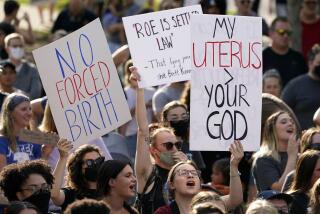Iowa’s Had Its Moment of Splendor--but Why? : In the end, the atypical state’s caucuses often mean little
- Share via
Just what is it that accounts for Iowa’s apparent political importance, come the late winter of every presidential election year?
Certainly it’s not that Iowa has any remotely plausible claim to being either demographically or electorally representative. With a population of 2.8 million, about 1.1% of the U.S. total, Iowa has fewer people than Los Angeles. It is 96.9% white, while the national figure is 74%, and 39% rural, while more than 80% of Americans live in metropolitan areas. Household income for Iowans is $26,229, $5,000 less than the national median.
Between the night of the caucuses in February and election day in November, few presidential candidates bother to visit the Hawkeye State, which casts only seven electoral votes (270 are needed to win). Yet for long weeks every fourth year, candidates flock to Iowa and spend millions to flatter and court its voters, in the media and face to face.
This week, in the closely watched Republican caucuses, about 130,000 of Iowa’s 575,000 registered GOP voters gathered in more than 2,000 meeting places to express their preferences. The results led front pages and the TV news. Why? What gives the Iowa caucuses their significance?
Simple. The candidates and therefore the media treat Iowa as if it were important, and so it indeed becomes important. Iowa looms large to the candidates because it holds the nation’s first full-scale caucuses, just as New Hampshire, another wholly atypical state, looms far larger than its modest electoral weight because it holds the first primaries.
Iowa can be a place where little-known candidates suddenly leap into the national spotlight, as Jimmy Carter did when he won the Democratic caucus in 1976. Or it can be a place where being a triumphant caucus winner--like George Bush in 1980 or Bob Dole and Dick Gephardt in 1988--only begins a process ending in rejection. Iowa can’t be said to have much of a record when it comes to predicting either the nominees of the major parties or the next president. For some presidential hopefuls, however, it is inevitably the first stop on the fast track to elimination.
The true lesson of Iowa is that there are no consistent lessons to be inferred. Did Iowa help or harm front-runner Bob Dole, who drew only a little more than one-fourth of the Republican votes? Pat Buchanan was heavily supported by those who identify themselves with the religious right and finished second with 23%. Does that give his candidacy real credibility or does it boost concerns that Buchanan may be too extreme to be a national winner? Lamar Alexander, running a strong third, can now claim the right to be taken seriously. Steve Forbes, after spending $4 million of his own wealth to secure only 10,000 votes, has to be wondering whether the heavy negative emphasis in his campaign ads was a wise use of resources. Phil Gramm, supported by only 9% of GOP voters, must be pondering the wording of his withdrawal statement.
A week from now the New Hampshire GOP primary will be history. After that come the more serious presidential preference contests, including California’s on March 26. American voters can be forgiven if they have trouble holding their excitement in check.
More to Read
Get the L.A. Times Politics newsletter
Deeply reported insights into legislation, politics and policy from Sacramento, Washington and beyond. In your inbox twice per week.
You may occasionally receive promotional content from the Los Angeles Times.










